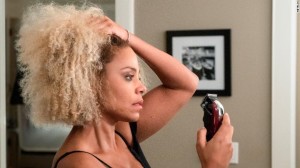And She Lived Nappily Ever After . . .

The Netflix feature film stars actress, Sanaa Lathan (Love and Basketball), who plays the role of Violet Jones, a Black woman who has struggled her entire life with her “nappy” hair, which is something a lot of us Black girls have dealt with ourselves. The term nappy was first used in the late 15th century in reference to napping, but as time went on, it was used to describe clothes with fuzzy textures. It wasn’t until slavery that the word became a derogatory term used to insult the hair of enslaved African humans because of their kinky and coily curl patterns.
Ever since her childhood, Violet has always worn her hair straight, but it was never by choice. The movie begins with a young Violet (Gabrielle Manning) sitting at the kitchen table as her mother, Pauletta (Lynn Whitfield) straightens her hair with a hot-comb. A hot-comb is a hair tool that – when it was first invented by either Annie Malone or Madam C.J. Walker – was placed over a burning flame, where it would sit until its metal reached a temperature of over two hundred degrees, and then applied to a person’s hair until their hair was bone-straight. In this more technologically advanced society, there are now versions of the device that can be plugged into a power outlet to achieve the same desired effect as older hot-combs.
Due to Violet being taught that her curly hair was unattractive and untamable in its natural state, she developed a love for wigs and weaves because it helped conceal her hair. Wigs and weaves are very important for Black women because it is a protective hairstyle for us. It allows us to take a break from the constant manipulating of our hair follicles, and it gives our scalps a chance to be at rest until it’s wash or take-down day. More than that, she also wore her natural hair straight all the time. Anyone knows that applying too much heat to your hair will damage it. So how did she get away with doing it for so long?
Another major influence for Violet’s love for straight hair is her workplace. Whenever she’s at work, she the hotshot there; all eyes are on her because she looks great and she knows that. Having hair is sure to make anyone feel confident, no matter the texture or length. Not only is Violet succeeding in her work life, but her romantic life is skyrocketing as well. She’s been dating her boyfriend, Clint, who’s a doctor, for two years, and she feels it in her heart that he’s ready to pop the big question. Everything is going perfectly for the perfectionist!
When she goes to a hair salon to get her hair styled for her upcoming family dinner event, Violet gets into a tiff with Zoe, a child, who knows too much pertaining to adult matters. Violet refers to the child’s hair as a “mop,” to which the child responds by sneaking relaxer into her shampoo treatment. That, of course, makes most of Violet’s hair fall out.
At the family dinner, donned in a wig to conceal what could be salvaged on her head, Violet is absolutely certain that her Clint is going to ask for her hand in marriage to complete her perfect life. But much to Violet’s dismay, instead of surprising her with a ring in a box, he surprises her with Lola . . . a chihuahua.
The shock of the dog forces Violet to confront Clint about where he thinks their relationship is (because they’re obviously on two completely different pages). Adding onto her surprise, he tells her that he feels like he’s been on the first date with her since their relationship started. All of this leads Violet to spiral out of control. She breaks up with him, kicks him out, and then goes out to get drunk.
In her drunken state, Violet is seriously assessing the amount of heartbreak she’s feeling, from both the loss of her hair and boyfriend. So, to make herself forget for just a second, she grabs the clippers and cuts all of her hair off. Every. Single. Inch.
If I had never, ever cut my hair before, I would be completely and utterly shocked that Sanaa Lathan is actually cutting off all of hers! However, cutting your hair is extremely relieving. It’s like, as each section that signifies many years of confusion and tension floats to the ground, it’s taking with it the stresses of life. Not only that but going from having a head full of hair to none at all is really one of the best forms of self-discovery. I, like Violet, used to hide behind my hair because it was a mask of perfection. When your hair looks good, you look good even if you don’t. Hair is important because every little thing revolves around it. Work, school, romance, happiness, etc. What’s life without hair?
Let me tell you: Life without hair is good. So, so good.
After cutting your hair, there are many stages you go through, kind of like with grief:
- Shock
This is the part where you’re like, “Did I really do that? What am I going to do with no hair?!”
- Denial
The denial stage is always fun. You really question your sanity here. You also question what actually led you to cutting your hair. You’re sure that whatever it was couldn’t have been that bad.
- Acceptance
In the movie, this is vital. Your hair can’t grow strong and long if you can’t accept the fact that it’s gone. As soon as Violet did that, life was better for her. She’d begun seeing Zoe’s father, Richard, who’s a hairdresser, and he was helping her discover what it means to truly love her hair. Not only that, but Violet’s popularity significantly dropped at work as soon as her hair was gone, but that’s okay. That just made her work even harder to see herself in a new light.
- Growth
Violet, after coming to terms with herself, began flourishing like a flower. Her hair was growing, and work was going . . . it wasn’t so great, but on the bright side, she and Clint got back together! Kind of . . .
This is the part in the movie where you think it’s going to be the most predictable thing ever, but surprise! It isn’t. Even though it seems like Violet has a budding romance with Richard, but she goes back to Clint because she still loves him, she doesn’t choose either guy in the end. She chooses herself. And that is what self-discovery is all about. As soon as you learn to love yourself, you begin to put yourself first.
If you haven’t seen Nappily Ever After, log into Netflix as soon as possible and get comfortable. You’re in for a great film.



